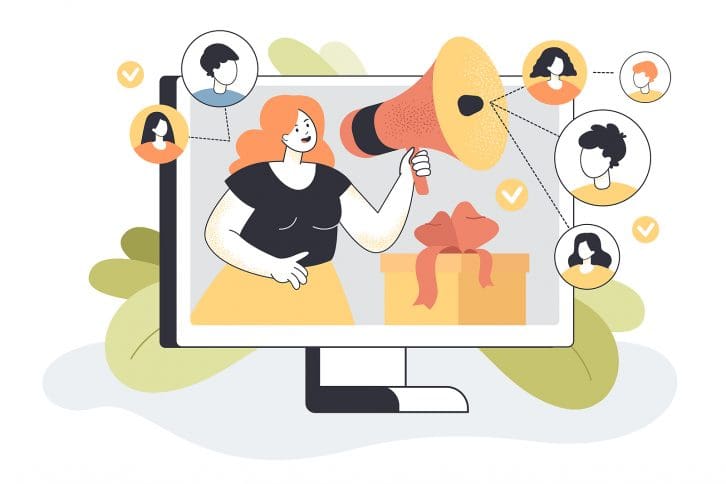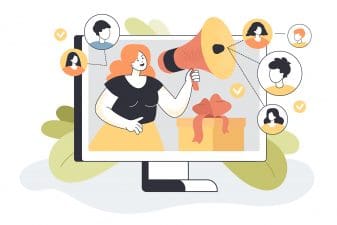
It’s hard to ignore the impact that influencers have had on content creation and business/product promotion over the last few years. If you have a small business, working with the right influencers can help you grow while introducing new people to your brand. Consumers tend to trust social media influencers over brands due to their perceived authenticity and established rapport with their followers. You can expand your target audience and build trust by letting an influencer use the relationship they have with their fans to vouch for your business.
However, it’s not always as simple as reaching out to the most popular influencers and expecting immediate results. Partnering with influencers requires some planning and preparation, and you’ll have to decide ahead of time exactly how you want your brand to be portrayed.
Also on Mediabistro


With that in mind, let’s look at some effective tips and ideas your small creative business can try as you consider partnering with influencers, and how to make the most out of that relationship. Along the way, you might end up learning more about your brand and what you want your business to look like in the future.
1. Plan ahead
Before you consider working with an influencer, it’s important to look at your long-term goals, as well as how influencers might fit in with your budget. Social media is often a great low-cost marketing strategy for small businesses. Social media allows you to build your brand on a budget by:
- Learning more about your audience
- Encouraging user-generated content
- Engaging with your audience
- Building your professional network
Technically, influencer marketing is considered a part of social media marketing, depending on where things are getting shared. However, popular influencers can be costly to work with due to their massive reach. Before you automatically assume any influencer is too much for your budget, look locally or in your niche. Micro-influencers are often less expensive and can have a huge pull on a local or niche audience. If you’re a small, creative business that just wants to advertise within a specific region or industry, micro-influencers can offer the best of both worlds.
2. Partner with the right people
When looking at your goals, one of the most important things to consider is whom you want to work with. Even if you have the budget to hire a top-tier influencer, they might not be the right fit for your business.
That’s another reason why looking for local and niche influencers can be beneficial. They’re likely to have industry recognition and an established audience that trusts their recommendations. However, if you want to branch out, make sure the influencers you consider are relevant, trustworthy, and credible. The reason consumers trust influencers more than brands is the human quality they provide. If someone isn’t authentic, it won’t take long for your audience to find out, and the influencer you’re working with could end up doing more harm than good. Nowadays, consumers want to connect with companies that are interested in forming relationships, not ones that are trying to make a quick sale with a celebrity spokesperson.
The idea behind influencer marketing is to help your brand grow organically through trust and engagement. If you’re a creative business, you’ll want to choose influencers that have that same flair for the creative, and people who cater to an audience that is excited about thinking outside the box.
At the end of the day, the right influencers will also share your values and positively reflect your brand. For example, if you pride yourself on being a sustainable business, you’re not going to want to partner with someone who doesn’t view sustainability as a priority. If you want to express inclusivity through advertising, consider working with diverse influencers from different backgrounds. The more in touch your influencers are with your brand, the better your relationship will be.
3. Maintain brand authenticity
If you’re struggling to find someone to represent your brand, it could be because you haven’t fully established your brand identity yet. Brand identity starts with discovering whom your audience is and what problems you can solve for them. If you’re a creative business, this might look different than providing tangible solutions. Instead, figure out how you can enrich the lives of your consumers.
From there, there are a few key steps to finding your identity as a business, including:
- Researching competition
- Having a unique idea or perspective
- Showing consistency
- Choosing your voice
When you have a clear identity, you can share those values and expectations with any influencer you want to work with. It will make it easier to find the right people, establish a strong relationship, and appear as authentic and transparent to your audience as possible. Remember, influencer marketing isn’t going to take over your entire strategy. Everything else you do when it comes to advertising needs to line up in the same way. Consistency is key, and your audience will call you out on it if you aren’t being true to the brand you’ve established.
Whether you want to keep things local or grow your small, creative business to global proportions, partnering with influencers can help. Keep these tips in mind to establish a clearer vision of your brand and your goals and ensure you’re partnering with the right people to help your business grow and engage more fully with your audience.









